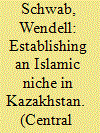|
|
|
Sort Order |
|
|
|
Items / Page
|
|
|
|
|
|
|
| Srl | Item |
| 1 |
ID:
106447


|
|
|
|
|
| Publication |
2011.
|
| Summary/Abstract |
There has been an increase in Muslim piety and practice in Kazakhstan since the fall of the Soviet Union. Much of this increase is due to the efforts of members of the piety movement in Kazakhstan, who preach and publish about Islam in an effort to inspire more Kazakhs to embrace a particular vision of Islam emphasizing daily prayer, modest dress and condemnation of saint and ancestor veneration. From its humble beginnings as a press primarily publishing translations of short books on Islam, Musylman Publishing House has grown to become an influential Islamic press in Kazakhstan. Building on observations at the Musylman Publishing House editorial office and interviews with its staff, this essay examines the history and publications of Musylman Publishing House. It is argued that the publishing strategy directed by Qayrat Isa, the owner and chief editor of Musylman Publishing House, has been a conscious effort to establish, expand and consolidate a publishing niche for the piety movement in Kazakhstan. The result of this strategy has been the establishment of a readership that no longer simply reads about Islam, but actively preaches to others and contributes articles and books to Musylman Publishing House, creating a self-sustaining piety movement.
|
|
|
|
|
|
|
|
|
|
|
|
|
|
|
|
| 2 |
ID:
113239


|
|
|
|
|
| Publication |
2012.
|
| Summary/Abstract |
After the dissolution of the Soviet Union, translations of the Qur'an and books of hadiths became widely available in Kazakhstan for the first time in 70 years. However, most Kazakhs do not read the Qur'an or books of hadiths on a regular basis. This essay examines the ways in which two young Kazakh woman who do read the Qur'an and hadiths learned to interpret and use these texts. I describe how the first young woman, who is a member of the piety movement in Kazakhstan, reads the Qur'an and books of hadiths on a daily basis using a schema that emphasizes the Prophet, the Qur'an, hadiths, and the differences between Muslims and non-Muslims. The second young woman, who is a member of Ata Zholy, an Islamic movement in Kazakhstan that focuses on revitalizing Kazakh traditions, reads these texts only occasionally and uses a schema that emphasizes ancestors, saints, tradition, and linking contemporary Kazakhs with an idealized Kazakh Islamic past. I link the ways that these two women learned their respective interpretive schemas to their family's practice of Islam and, more broadly, to the restriction of Islamic practice in the Soviet era.
|
|
|
|
|
|
|
|
|
|
|
|
|
|
|
|
|
|
|
|
|